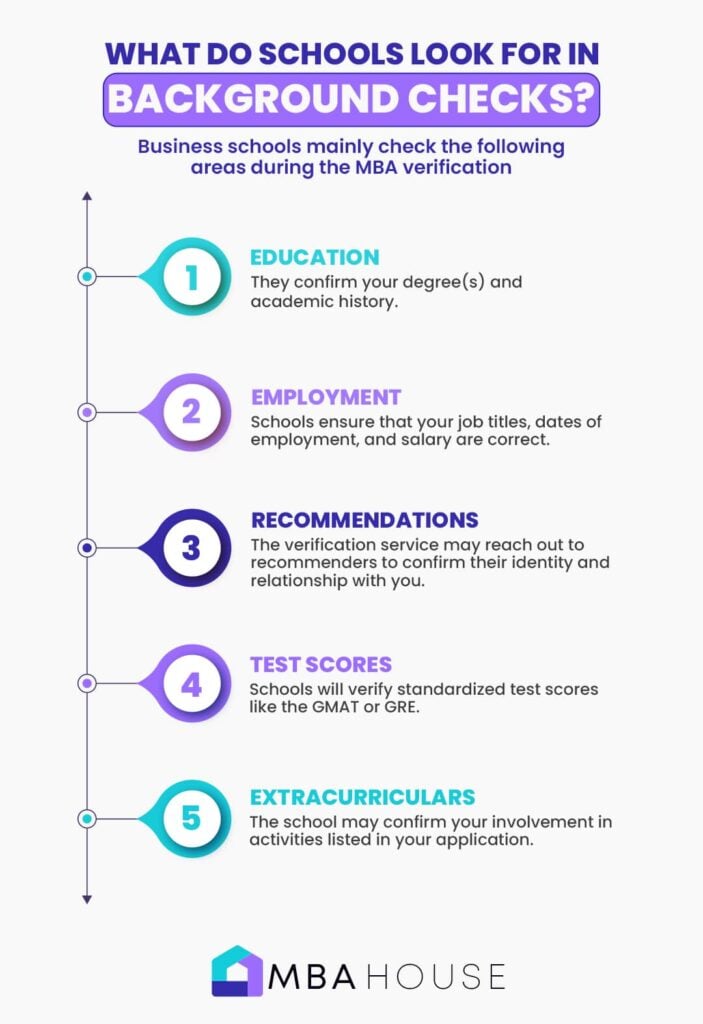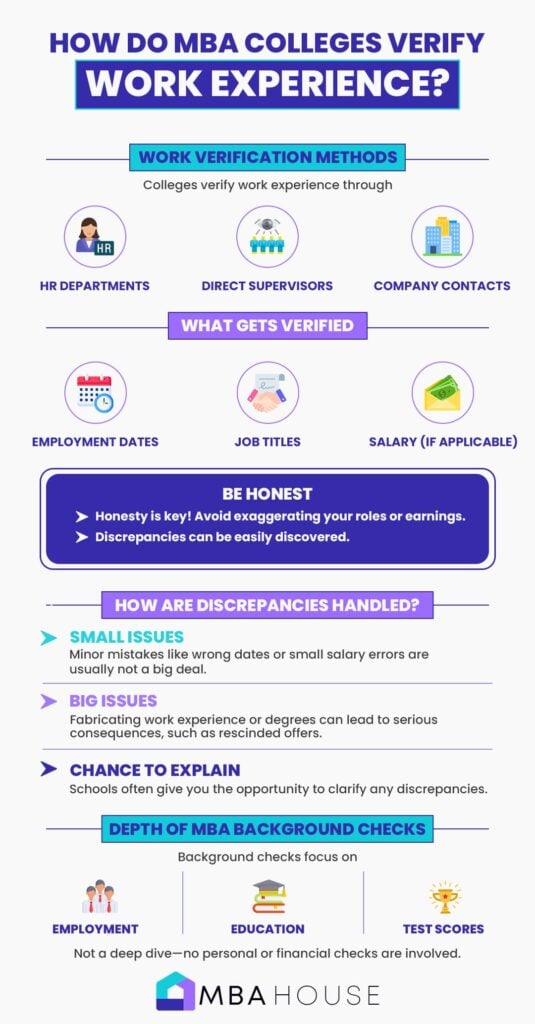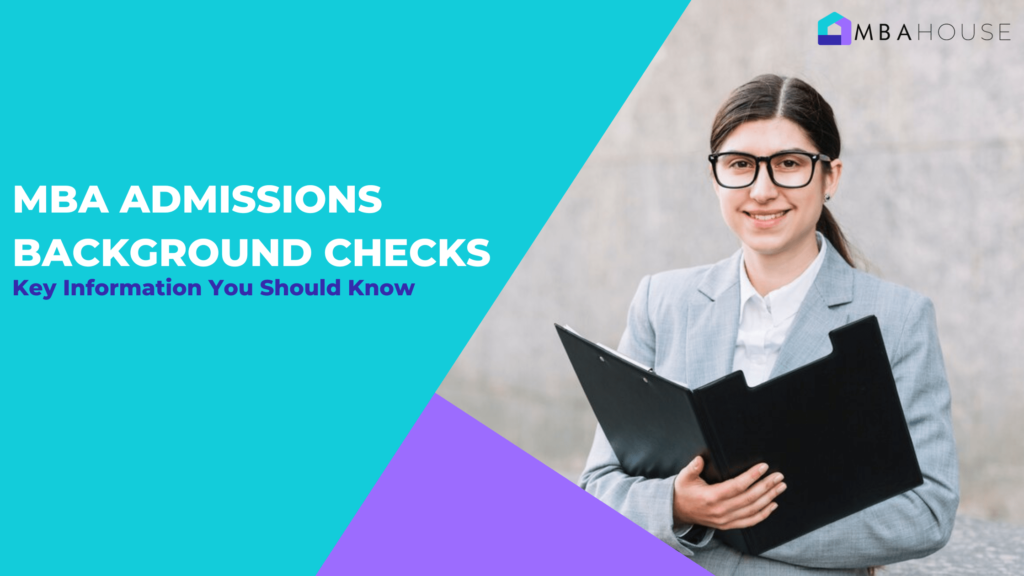When applying for an MBA, many aspirants wonder, “What if the admissions committee digs into my past?” Understanding the background check process is crucial, as it’s a part of the MBA application process for most top business schools. While it can feel overwhelming, especially for those who have had an unconventional career path or periods of job transitions, knowing what to expect can ease a lot of concerns. Let’s dive into what happens during an MBA background check, why it matters, and how to navigate it smoothly.
Why Do Background Checks Matter in MBA Admissions?
Imagine this: You’ve worked hard, submitted your MBA application, and are now anxiously waiting for that acceptance letter. Suddenly, you realize you may have slightly miscalculated your employment dates or understated your bonus. Panic sets in. Will this small mistake affect your chances of being admitted?
The truth is, that top MBA programs want to ensure that applicants have accurately represented themselves. It’s not about digging into every single detail of your life, but rather confirming the key points of your MBA application process. Business schools trust their applicants, but they also need to protect their own reputation and maintain fairness in the admissions process. This is why many schools use background verification services like Re Vera, a company specializing in these checks.
Schools aren’t trying to catch you out. They simply want to verify information like your degree, work experience, and test scores to ensure there are no significant discrepancies. For most applicants, this process is a breeze, but it’s natural to have concerns. Let’s explore what happens behind the scenes and answer the questions that are likely on your mind.
What Do Schools Look for in Background Checks?

The goal of the MBA background check is to ensure that the information you provided in your application is accurate. This includes verifying your:
- Education: They confirm your degree(s) and academic history.
- Employment: Schools ensure that your job titles, dates of employment, and salary are correct.
- Recommendations: The verification service may reach out to recommenders to confirm their identity and relationship with you.
- Test Scores: Schools will verify standardized test scores like the GMAT or GRE.
- Extracurriculars: The school may confirm your involvement in activities listed in your application.
These checks are handled by third-party verification services like Re Vera, which schools trust to confirm these details. It’s important to remember that the process isn’t designed to be invasive. In fact, schools are usually quite discreet about it, often confirming employment details through HR departments without revealing that you’re applying for an MBA.
How Do MBA Colleges Verify Work Experience?

A common worry among applicants is how their work experience will be verified. After all, some positions might have been at smaller companies, startups, or even abroad. How does the school ensure that the information is correct?
Typically, the MBA admissions process involves verifying employment through HR departments or direct supervisors. This includes confirming dates of employment, job titles, and sometimes even salary. If you exaggerated your role or inflated your earnings, this is when the truth might come to light.
For example, one applicant was concerned about verifying their salary because they had exaggerated it slightly on their application. However, when asked to explain, they were able to clarify that the difference was due to a bonus they had received that year. This demonstrates the importance of honesty in your application. If you can explain the discrepancies, you should be fine.
The takeaway? Be as truthful and precise as possible when listing your job history. If you made a mistake, own up to it and provide supporting documentation. Most schools are reasonable and understand that minor errors happen.
What Happens if There Are Discrepancies?
One of the biggest concerns for applicants is, “What if something doesn’t match up?” Mistakes happen, and not every discrepancy will lead to an admissions offer being revoked. Schools are usually lenient when it comes to minor mistakes, like a miscalculated start date or a slight salary difference. However, larger issues like falsifying a degree or completely fabricating work experience will raise red flags.
If the verification company finds something that doesn’t add up, they may contact you for clarification. In most cases, schools give applicants the chance to explain any discrepancies. This is why it’s critical to be honest from the beginning. Trying to correct a lie or omission after the fact can cause more harm than good.
On rare occasions when significant discrepancies remain unresolved, schools have been known to rescind admission offers. This is not common, but it does happen, especially if the issue involves ethical lapses like falsifying information.
Here’s a table summarizing common discrepancies and how schools typically handle them:
| Type of Discrepancy | Example | How Schools Handle It |
| Minor Mistake | The start date is off by a few days | Usually overlooked or clarified through HR |
| Misreporting Salary | Salary slightly inflated | Clarification requested, typically not a deal-breaker |
| Degree Error | Incorrect graduation date | Clarified through verification service, no serious issue |
| Ethical Lapse (e.g., falsifying info) | Completely fabricated work experience | This can lead to the rescinding of an admission offer |
How Deep Do MBA Background Checks Go?
You might wonder how deep these checks go. Are they digging into every detail of your life, from childhood grades to personal relationships? Thankfully, no. Background checks for MBA programs are relatively high-level. They focus on the information provided in your application, such as employment, education, and test scores.
This is not an FBI-level investigation. In fact, most schools outsource this process to services like Re Vera, which specializes in verifying the specific details that schools request. They will not delve into personal matters or sensitive financial information.
What Can You Do to Ensure a Smooth Process?
To make the verification process smooth and stress-free, follow these tips:
-
-
- Be Honest: Don’t exaggerate or lie on your application. Schools appreciate transparency, even if your record isn’t perfect.
- Double-Check Your Information: Make sure your employment dates, salary figures, and academic history are correct before submitting your application.
- Gather Documentation: Keep important documents like W-2 forms, pay stubs, and transcripts handy, just in case.
- Respond Promptly: If the verification service contacts you for clarification, respond quickly and provide any necessary documentation.
-
Conclusion
Transparency is Key!
At the end of the day, the MBA background check is just a part of the admissions process, not something to fear. By being honest and transparent in your application, you’ll have nothing to worry about. Schools simply want to verify that you’ve accurately represented yourself. Most applicants sail through the process without any issues, but it’s always wise to be prepared.
Remember, your goal is to showcase your strengths and experiences authentically. As long as you’ve done that, the background check should be a breeze.
MBA House is dedicated to guiding you through every step of your MBA journey with unmatched support.
With our “Unlimited Everything” approach, we offer unlimited questions, drafts, revisions, and access to experts whenever you need them. Our personalized services include everything from essay and resume reviews to interview prep and scholarship negotiation, ensuring that every aspect of your application is optimized for success. Whether you’re fine-tuning your application strategy or navigating admissions decisions, we’ve got your back.
If you have any questions or need further assistance, feel free to reach out to us at [email protected].
FAQs
Do MBA colleges do background checks?
Yes, many MBA programs conduct background checks, especially for admitted candidates, to verify the information provided in their applications.
What background is needed for an MBA?
An MBA program typically requires a bachelor’s degree, work experience, and a standardized test score (GMAT/GRE), but specific requirements vary by school.
What is checked in education in background checks?
Schools verify your degree, the institution you attended, and your academic transcripts, including your GPA.
What is the minimum requirement for an MBA?
Most MBA programs require a bachelor’s degree, a GMAT/GRE score, and professional work experience, though specific requirements vary by school.
How deep do MBA background checks go?
MBA background checks typically verify education, employment, and recommendations but do not delve into personal or sensitive information like credit scores.





Social Media